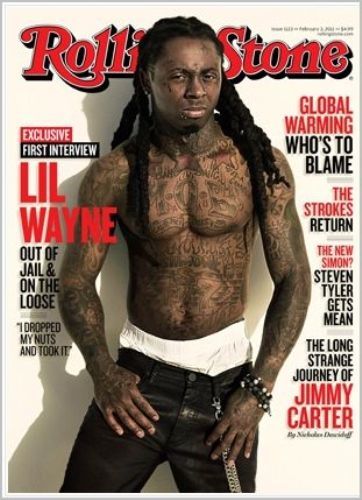
The latest issue of Rolling Stone arrived in the mail this week with Lil’ Wayne gracing the cover. As someone who has not been swept up in the rap revolution, I must confess I don’t know much about Lil’ Wayne or his music other than (contrary to his moniker) he’s one of the biggest stars in hip-hop, he sports an impressive array of tattoos, he recently spent time in jail for criminal possession of a weapon, and the headlines he makes outside of venues like Rolling Stone usually reference drugs or lawsuits. He’s not the kind of guy likely to win any upstanding citizen or man-of-the-year awards anytime soon. Even still, Rolling Stone’s February 3rd feature reveals a much more complex human being than the gangsta typically portrayed in the media and by music industry PR–even one capable of prophesying to the religious establishment.
Knowing what I know of Jesus, I really shouldn’t have been surprised to read prophetic words coming from the lips of Lil’ Wayne. But they caught me off guard nonetheless when I stumbled across them in his conversation with Josh Eells about his time in Rikers, sandwiched between what he ate and what he listened to on the radio while he was behind bars. As Wayne outlines the extensive reading list he worked through during the eight months of his sentence, he mentions the Bible, which he says he read cover to cover for the first time.

So what did you think [of the Bible]?, Eells asks. “It was deep! I liked the parts where some character was once this, but he ended up being that. Like he’d be dissing Jesus, and then he ends up being a saint. That was cool.”
In other words, Jesus made a difference in people’s lives. He changed them, transformed them, turned them around; He led them to greener pastures and set their feet on firmer ground.
“It was deep! I liked the parts where some character was once this, but he ended up being that. Like he’d be dissing Jesus, and then he ends up being a saint. That was cool.”
Perhaps if I had sat down to read this article at a different time, Lil’ Wayne’s words wouldn’t have struck me as forcefully as they did. But in a month filled with church discussions, debates, even arguments about such things as employee regulations and whether or not it’s appropriate to clap in worship, they jolted me–much in the same way I snap to attention when I realize I’m dozing off at the wheel. It was as if Jesus Himself were confronting me. What ministries and activities at your church, Rev. Thomason–or any church, for that matter–are really grounded in and invested in the “cool” parts of the Gospel: helping people who were once this become that? Lots of Christians like to talk about it, and even more like to nod their heads when others talk about it. But do you actually facilitate it? Do you actually get your hands dirty with it? Or do you prefer (or even insist upon) people already being turned around before they step through the doors to join the propriety of the sanctuary? And are you more interested in proclaiming the Kingdom of Heaven or maintaining that propriety? Who’s really dissing who, here?
“What ministries and activities at your church, Rev. Thomason–or any church, for that matter–are really grounded in and invested in the “cool” parts of the Gospel: helping people who were once this become that? “
The honest answers to these questions are short and simple; the solutions for changing the institutional realities behind them are not. But as I put down Rolling Stone and reach for my Bible to begin preparing for church, one thing is clear: we Christians need to rediscover the “cool” parts of the Gospel–even if we have to journey to Rikers to find them. And perhaps we do. In Matthew 25, Christ strongly encourages us to visit those in prison. Moreover, the New Testament isn’t just something that’s read a lot in prison; portions of it were written in prison. It would seem there is something about incarceration we need to see, if not experience, if we’re to understand what the Kingdom is all about. Maybe prison is the place where we come to understand what it truly means to be this and become that. Maybe that’s how we gain the perspective we need to deal with Jesus’ questions–a perspective we cannot find in the well-groomed, well-ordered propriety of our sanctuaries.




























